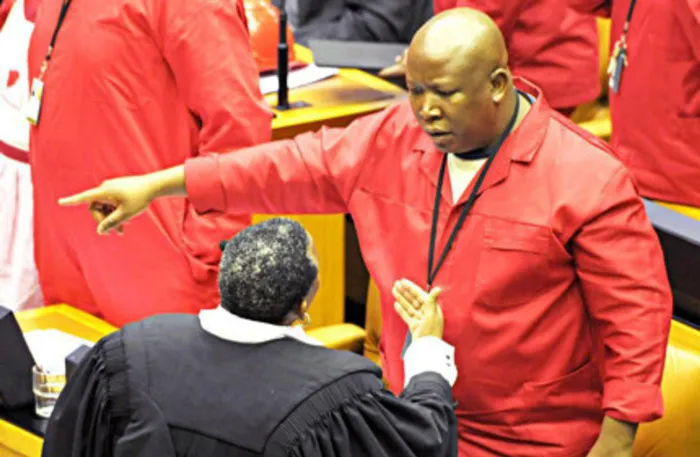EFF MPs ‘guilty of disobeying Speaker’

EFF MPs were found guilty of refusing to obey the Speaker's instructions to take their seats in Parliament. EFF MPs were found guilty of refusing to obey the Speaker's instructions to take their seats in Parliament.
Cape Town -
After some 12 hours of deliberations late on Monday night, ANC MPs on Parliament’s powers and privileges committee used their numbers to ensure a guilty verdict against 20 EFF MPs for the “Pay back the Money” ruckus that scuppered presidential question time.
It is understood opposition parties expressed various reservations about the disciplinary process itself and issues related to the contempt of Parliament charges, but were defeated.
The ANC has the most numbers on any parliamentary committee due to its strength in the National Assembly.
Now the DA, United Democratic Movement (UDM) and the IFP are set to write a letter of complaint over the non-appearance of State Security Minister David Mahlobo and Telecommunications Minister Siyabonga Cwele.
The committee agreed to call them as witnesses – they were on the floor after the house adjourned that day – in the end both submitted just affidavits and were never called.
While powers and privileges committee chairman, Lemias Mashile, last night declined to comment on the committee deliberations – “Not today (Monday). It’s only tomorrow (Tuesday) I will be able to speak to you,” he said – two opposition MPs were outspoken on the guilty verdict.
“It was clear from the outset they (ANC) were not going to be persuaded. They were in a hurry to find people guilty,” said United Democratic Movement MP, Mncedisi Filtane.
He added that he was uncertain whether to attend the next committee meeting scheduled for later this week to determine a sanction “when it is clear they want the maximum penalty”.
Another opposition MP was more diplomatic, saying the committee “was not unanimous”, but the majority had found the EFF MPs guilty despite opposition reservations.
It is understood the discussions were heated before the powers and privileges committee finally wrapped up deliberations after 9pm on Monday night.
Key points of contention between the ANC and opposition parties included the non-appearance of Speaker Baleka Mbete, who brought the complaint, and the lack of testimony from the two ministers.
The opposition parties had pushed for Mbete to testify. however this was defeated in what was described as a decision to agree to disagree.
Filtane and the other opposition MP, who preferred not to be named, said the ruling party upheld what initiator, Randall van Voore, the lawyer hired to lead evidence, told the committee last week – that the EFF MPs had “deliberately” and “intentionally” refused to obey the Speaker’s instructions to first take their seats and then to leave the house.
Filtane said he did not find anyone guilty – there were problems with how the Speaker handled the situation, and also questions over the proper functioning of the equipment with which MPs indicated their wish to speak.
There would not have been the levels of frustration, if this had been handled properly, he added.
EFF leader, Julius Malema, and his 18 MPs refused to participate in the disciplinary proceedings they described as biased and predetermined. It is understood the representation Malema made before withdrawing from proceedings was another bone of contention in yesterday’s deliberation.
They were charged with contempt after their “Pay back the Money” fracas, which ultimately led to the abandonment of presidential question time on August 21.
The fracas, including singing and banging on tables, broke out after the EFF felt Jacob Zuma had not answered a direct question when and how he would repay the money.
This is a reference to the public protector finding the president should repay at least some of the R215 million taxpayer-funded security upgrades at his Nkandla rural homestead that had been spent on non-security benefits like the swimming pool, cattle kraal and visitors centre.
According to the 2004 Powers, Privileges and Immunities of Parliament and Provincial Legislatures Act, a guilty verdict by the committee could incur, as its heaviest penalty, a month-long suspension from Parliament without pay, but penalties could also range from a formal warning, reprimand, an order to apologise, a fine of no more than a month’s salary.